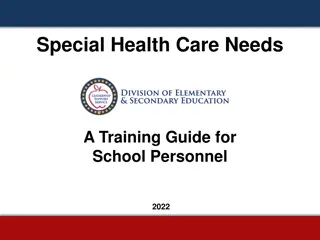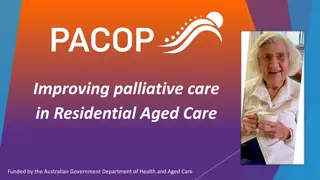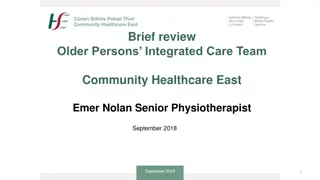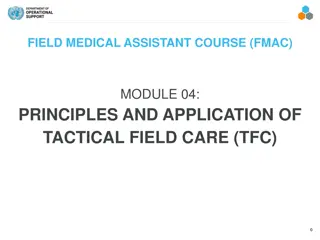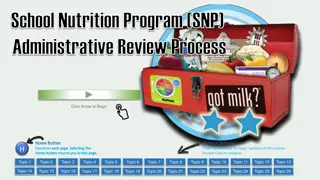SNP Model of Care (MOC) Training for Special Needs Individuals
The Medicare Modernization Act of 2003 established Medicare Advantage Coordinated Choice Plans to provide targeted care for special needs individuals. Imperial Insurance Companies, Inc. offers SNP services in Arizona, Nevada, and Texas counties. A population assessment guides the Model of Care development, considering factors like age, gender, chronic conditions, and healthcare barriers. The program includes D-SNPs for dual eligible members and C-SNPs for those with chronic disorders. Objectives focus on improving care transitions, communication, and outcomes while enhancing access to services and resources.
Download Presentation

Please find below an Image/Link to download the presentation.
The content on the website is provided AS IS for your information and personal use only. It may not be sold, licensed, or shared on other websites without obtaining consent from the author.If you encounter any issues during the download, it is possible that the publisher has removed the file from their server.
You are allowed to download the files provided on this website for personal or commercial use, subject to the condition that they are used lawfully. All files are the property of their respective owners.
The content on the website is provided AS IS for your information and personal use only. It may not be sold, licensed, or shared on other websites without obtaining consent from the author.
E N D
Presentation Transcript
SNP MODEL OF CARE (MOC) TRAINING IMPERIAL INSURANCE COMPANIES, INC.
SNP Overview The Medicare Modernization Act of 2003 (MMA) established a Medicare Advantage Coordinated Choice Plans specifically designed to provide targeted care to individuals with special needs. Special needs individuals are 1) dual eligible; Members who qualify for both Medicaid and Medicare 2) institutionalized individuals; and/or 3) individuals with severe or disabling chronic conditions, as specified by CMS
SNP POPULATION Imperial Insurance Companies, Inc. services SNP members in the following States / Counties STATE ARIZONA NEVADA TEXAS COUNTY Pima, Maricopa, Pinal, Yavapai, Coconino Clark Bexar, Dallas, El Paso, Harris, Tarrant, Travis, Williamson, Hays, Denton, Collin, Comal, Fort Bend, Galveston, Montgomery, Nueces, Wise
SNP Overview We perform a population assessment to build a Model of Care that will best serve the needs of the members. Some of the factors identified include but not limited to the following: Age, Gender, Ethnicity Incidence of major diseases and chronic conditions Language barriers and health literacy Identification based on multiple hospital admissions, high pharmacy utilization, high cost, or combination of medical, psychosocial, cognitive and functional challenges
SNPs D-SNPs for members that are dually eligible for Medicare and Medicaid C-SNPs for members with chronic and disabling disorders. One or more of the following chronic diseases depending on the specific plan: Diabetes Chronic Heart Failure Cardiovascular Disorders: Cardiac Arrhythmias Coronary Artery Disease Peripheral Vascular Disease Chronic Venous Thromboembolic Disorder
MOC Goals Improve Transitions of Care Communication between providers Assistance in Transition to care settings (home, hospital, etc.) Avoidance of Readmission and/or ER Improve Access to Services Preventive Health both general & patient specific Provider Accessibility Community Resource Needs both clinical and non-clinical Health department, Rural Clinics, Home Care Senior Centers, Food, Transportation, Housing Improve Outcomes Reduce Admissions and Readmissions Improve perceived Health Status Medication adherence and safety Performance of goals measured through reporting, monitoring and surveys of membership.
Staff Structure All staff work as an integrated team for care management of the enrollee. Staff Roles include but are not limited to: Administrative Staff Member/Enrollee Services Customer Service Staff Appeals and Grievances Staff Member/Enrollee Accounting Team Claims Team Clinical Staff Behavioral health clinicians Licensed clinical social workers Psychologists mental health counselors Medical clinicians Community Connectors
Staff Structure and Description Administrative and Clinical Oversight Staff: The Quality Improvement Team monitors and evaluates MOC activities to help improve the programs. The Credentialing department is responsible for ensuring physicians are fully credentialed. The Human Resources team is responsible for ensuring ongoing monitoring is conducted in accordance with state and federal requirements. The Provider Services is responsible for network availability/access, provider training, and evaluation to ensure valuable member experiences. The Medial Director Team has oversight of the development, training and integrity of Healthcare Services and Quality Improvement programs. The team serves as a resource for Integrated Case Management Teams and providers regarding member/enrollee s health care needs and care plans. Selects and monitors usage of nationally recognized medical necessity criteria, preventive health guidelines and clinical practice guidelines.
Specialized Provider Network Imperial Health Plan has an adequate and specialized provider network that maintains the appropriate licensure and competency to address the needs of the target population. Imperial Health Plan maintains a comprehensive network of primary care providers and specialists such as Cardiologist, Oncologist, Pulmonologist, Nephrologist, PT, OT, ancillary providers, and facilities to meet the health needs of chronically ill, frail, and disabled SNP members. Imperial Health Plan provides the full SNP Model of Care with team based internal case management when it is not provided by the member s primary care provider and medical group. Provider network has specialized expertise utilizes clinical practice guidelines and protocols
Model of Care Training Initial/Annual Training Network Providers Health Plan staff Training Methods Webinars On Site at Provider Office Provider Manual with written training materials for reference/attestations Components of Training Model of Care Elements Plan Processes and Procedures Health Plan Tools and Resources
Health Risk Assessment (HRA) An HRA is conducted to identify medical, psychosocial, cognitive, functional, and mental health needs and risks. Imperial Health Plan attempts to complete initial HRA within 90 days of enrollment and annually via telephone. Multiple attempts are made to contact the patient including mailed surveys. The patient s HRA responses are used to identify needs, incorporated into the member s care plan and communicated to care team via electronic medical management system, the provider portal or by mail. Patient is reassessed if there is a change in health condition and these and annual updates are used to update the care plan.
Individual Care Plan Individual Care Plan (ICP) is created for each patient by the Case Manager with input from the care team. The member and caregivers are involved in development of and agrees with the care plan and goals. ICP is based on the patient s assessment and identified problems. Goals are prioritized considering patient's personal preferences and desired level of involvement in the process. ICP is revised when change such as new diagnosis/hospitalization or at least annually and communicated to Interdisciplinary care team (ICT) and member. Patient s self-management plans and goals are described. Barriers and progress towards goals are listed.
Care Management Case Managers coordinate the member s care with the Interdisciplinary Care Team (ICT) which includes designated IHP s staff, the member and their family/caregiver, doctors, specialists and vendors, anyone involved in the member s care based on the member s preference of who they wish to attend. Case Managers strive to do the right thing for members by encouraging self-management of their condition as well as communicating the member s progress toward these goals to the other members of the ICT. IHP is responsible to maintain a single, integrated care plan that requires reaching out to external ICT members to coordinate many separate plans of care into one that is made available to all providers based on member s preference.
Interdisciplinary Care Team (ICT)/Integrated Communication Network IMPERIAL HEALTH PLAN Imperial Health plan staff work with all members of the ICT in coordinating the plan of care for the enrollee FAMILY/ COMMUNITY SUPPORT PCP Member SPECIALISTS & FACILITIES VENDOR
Performance and Health Outcomes Measurement Process Measures Timeliness of Assessment processes Physician Relationship (% populations with PCP or Medical Home Relationship) Care Meetings Case/Care Management performance Care Measures Utilization Patterns Prescribing Patterns Drug interactions Readmissions Quality Measures HEDIS Quality of Care Concerns Satisfaction Surveys
QUESTIONS/COMMENTS Please contact our Provider Relations Department at (626) 838-5100 Prompt 5






